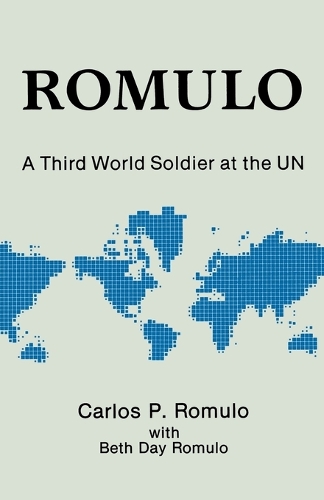
Romulo: A Third World Soldier at the UN
(Paperback)
Publishing Details
Romulo: A Third World Soldier at the UN
By (Author) Beth Day Romulo
Bloomsbury Publishing PLC
Praeger Publishers Inc
14th May 1987
United States
Classifications
Tertiary Education
Non Fiction
341.230924
Physical Properties
Paperback
244
Width 140mm, Height 216mm
284g
Description
In this valuable memoir, Gen. Carlos P. Romulo (1899-1985), the Philippine war hero and impassioned diplomat who was one of the signers of the United Nations Charter in 1945, re-creates the heady spirit of the early days of the United Nations. . . . A leading spokesman for newly independent third world countries, he lobbied successfully to get the right of colonial countries to independence included in the Charter. The New York Times Book Review In his fascinating volume, Carlos P. Romulo, retired Foreign Minister of the Philippines and first Asian President of the United Nations, describes the development of that organization from its founding in San Francisco in 1945, when he signed its charter, to his farewell speech to the General Assembly in the fall of 1983. Related in the form of personal memories and impressions, the facts and dates in his narrative have been thoroughly checked and corroborated by his wife and co-author so that they blend integrally with the broader fabric of United Nations history. Not only is this a personal memoir but also an accurate and valuable historical account of a critical period in the history of the world. The volume will certainly be of immense interest to readers concerned with the conduct of international diplomacy, East-West relations, or relations with Third World countries.
Reviews
In this valuable memoir, Gen. Carlos P. Romulo (1899-1985), the Philippine war hero and impassioned diplomat who was one of the signers of the United Nations Charter in 1945, re-creates the heady spirit of the early days of the United Nations. It was an era when what happened there captured the public eye.... A leading spokesman for newly independent third world countries, he lobbied successfully to get the right of colonial countries to independence included in the Charter. But he describes what he calls the bias of the great powers against the small nations even as the United Nations was beginning, a bias he says still exists today.... More valuable are his anecdotes from the battle between the Rockefeller family of New York and the mayor of San Francisco to put the headquarters of the United Nations in their respective cities to his one-man effort to humanize the Soviet bloc' by inviting the Czechoslovak delegation to a performance of South Pacific' and the Russians to the Metropolitan Opera.-The New York Times Book Review
"In this valuable memoir, Gen. Carlos P. Romulo (1899-1985), the Philippine war hero and impassioned diplomat who was one of the signers of the United Nations Charter in 1945, re-creates the heady spirit of the early days of the United Nations. It was an era when what happened there captured the public eye.... A leading spokesman for newly independent third world countries, he lobbied successfully to get the right of colonial countries to independence included in the Charter. But he describes what he calls the bias of the great powers against the small nations even as the United Nations was beginning, a bias he says still exists today.... More valuable are his anecdotes from the battle between the Rockefeller family of New York and the mayor of San Francisco to put the headquarters of the United Nations in their respective cities to his one-man effort to humanize the Soviet bloc' by inviting the Czechoslovak delegation to a performance of South Pacific' and the Russians to the Metropolitan Opera."-The New York Times Book Review
Author Bio
CARLOS P. ROMULO was Foreign Minister of the Phillipines and a past President of the United Nations. The recipient of more than seventy honorary degrees from academic institutions throughout the world, he received the Pulitzer Prize for Journalism in 1942.
